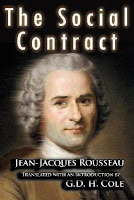by Jean-Jacques Rousseau
The book in which Rousseau theorized about the best way in which to set up a political community in the face of the problems of commercial society which he had already identified in his Discourse on Inequality (1754).
The Social Contract was a progressive work that helped inspire political reforms or revolutions in Europe, especially in France. The Social Contract argued against the idea that monarchs were divinely empowered to legislate; as Rousseau asserts, only the people, in the form of the sovereign, have that all powerful right.
The stated aim of the Social Contract is to determine whether there can be a legitimate political authority. In order to accomplish more and remove himself from the state of nature, man must enter into a Social Contract with others. In this social contract, everyone will be free because all forfeit the same amount of freedom and impose the same duties on all. Rousseau also argues that it is illogical for a man to surrender his freedom for slavery; and so, the participants must be free. Furthermore, although the contract imposes new law, especially laws safeguarding and regulating property, a person can exit it at any time (except in a time of need, for this is desertion), and is again as free as when he was born.

No comments:
Post a Comment